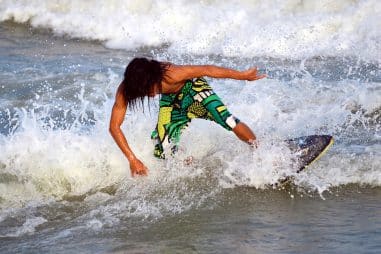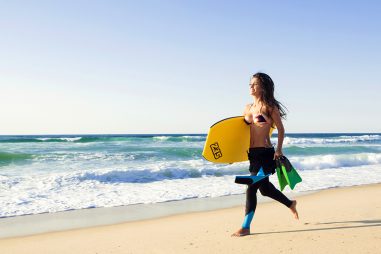Most surfers argue that surfing is the superior sport because it the more challenging to learn and master. Although surfers’ argument is somewhat true, it is undeniable that bodyboarding also requires a lot of skill for some of its most complex stunts. Read on to judge for yourself which of these two extreme water sports is best fitted for you.
Is Bodyboarding the Same as Surfing?
Although both sports are almost identically performed, there is a huge difference between surfing and bodyboarding. It is undeniable that the dissimilarities outweigh the sameness for these two water-based sports. But for now, let us focus on how bodyboarding is like the crowd’s favorite water sports surfing.
The goal for bodyboarding is the same as in surfing, which is to ride a wave continuously. Both riders use a board to catches and ride a wave back to the beach shore. Balancing and turning skills also play a crucial role in riding a wave successfully. Riding either a bodyboard or a surf board is always adrenaline-filled and exciting in its own way.
Does Bodyboarding Help Surfing?
Spending time on bodyboarding will certainly help a person to transition into surfing. Although bodyboarding is done lying on the board, you’ll gain more understanding about the ocean’s waves and the right timing to ride it. Frequently navigating around the ocean will help you be more familiar with the surf zone, boosting your confidence in the water.
Another advantage you can gain by doing bodyboarding or any other physical sports is an improvement in your physical fitness and body form. Both your arm, core strength, and cardiovascular fitness will benefit greatly from bodyboarding, and this can help you paddle more powerfully and efficiently. And lastly, your board balance which is a vital skill for surfing, will also significantly increase by continuously practicing bodyboarding.
What Is the Difference Between Bodyboarding and Surfing?
Bodyboarding and surfing have a huge difference in execution as well as in their discipline. There is a long ongoing debate in the history of these two most popular wave riding water sports on which one is better. Below is the list of differences between surfing and body, and we’ll let you decide which one is the best for you.
- Board in use: Surf board and bodyboard have almost the same durability, but most bodyboards are stiffer than a surf board. Surf boards are usually longer and heavier, while boogie boards are shorter and lighter. Because of the bodyboard’s smaller size, it is easier to transport than a surf board.
- Ease of Learning: It is very evident that bodyboarding is easier to learn than surfing. This is because a beginner will have more control when lying on the board compared to surfing which requires the surfer to stand up when riding a wave.
- Execution: Bodyboarding and surfing both aims to catch and ride a wave. One of the most distinct differences between these two sports is that surfing rides a wave while standing up while bodyboarding is done while lying down on the bodyboard.
- Safety: Since bodyboarding is mostly performed with the body lying on the board, a bodyboarder will less likely to get injured from falling in the water.
- Price: If you are eyeing to try bodyboarding, you’ll be pleased to know that you will definitely spend less money to buy a superior bodyboard than a good quality surf board. A rough estimate of $50 to $400 will be enough to buy a decent bodyboard, while a surf board can cost you up to $350 to $1000, depending on its quality and build.
- Tricks: Because surfing is performed while standing up, you can do more cool tricks and stunts in surfing than in bodyboarding. Executing surfing tricks requires a lot of skill from a surfer, and it has a lot of styles, varieties, and different difficulties. Learning surfing tricks takes time and a lot of practice to master, making it the more challenging water sport.
What Is the Difference Between a Bodyboard and a Surf board?
An effortless way to differentiate a bodyboard and surf board is by simple observation. One of the most obvious differences between these two boards is their board size. Bodyboards are shorter, lighter, and much easier to transport than a surf reboard. To match the riding style of surfing, surf boards are built longer and heavier.
Surf boards are also designed to help you catch bigger waves than a boogie board would. Even though getting on top of the wave is easier for surfing, remaining balanced while riding a wave is challenging and requires a lot of skill. Although bodyboards are not perfect for catching big waves, boogie boards allow you to ride the wave with more precision and stability.
Is Bodyboarding Easier Than Surfing?
Bodyboarding is a perfect practice for beginners who are still learning to ride a wave and anyone who wants to get familiar with any board water sports. While bodyboarding still requires a decent level of physical fitness and endurance, it is indeed less excruciating than surfing. Continuously standing on a surf board is exceedingly taxing to the body. A surfer should have an excellent sense of balance and a certain level of fitness to enjoy surfing fully.
Board stability is one of the most important skills to learn in any board sport. Since bodyboarding is performed lying to the board, an inexperienced rider is in the most stable body position and will get more board stability which lessens the probability of falling in the water. Some people prefer bodyboarding since it is more relaxed but still extremely entertaining.
Is Bodyboarding Safer Than Surfing?
Bodyboarding can also be enjoyed in shallow water, thus making it safer than surfing which is best performed in deeper parts of the ocean. Your body position in bodyboarding also gives provides more stability than standing up on a surf board. This added board stability will help you stay on top of your board and avoid injuries by falling it the water or ocean floor.
All extreme sports are often accompanied by accidents and injuries. Since these two water sports are very much alike, it is wise to practice preventive measures to avoid serious injuries. Checking the weather before going to the beach, using the board leash, and sharing waves with other surfers are some of the safety rules to apply.
Is Bodyboarding More Fun Than Surfing?
Determining “fun” is subjective and mostly a personal opinion, while both bodyboarding and surfing can be equally enjoyable in their own way. There are many factors worth considering to differentiate the enjoyment gained between surfing and bodyboarding. To get the most of surfing or bodyboarding, certain conditions should be met.
The type of ocean waves in your area can affect your surfing and bodyboarding, and it is more favorable to have big incoming waves for surfing than boogie boarding. If the waves on your beach are shallow, it is much better to do bodyboarding. Your physical capabilities can also limit the tricks and stunts you can do in any sport. Determining what works best for your skill and location will help you maximize your quality time on the beach.
Is Bodyboarding Considered Surfing?
Technically speaking, bodyboarding is also considered surfing but by using a bodyboard instead of a surf board. By definition, surfing is the act of riding a wave while standing or lying on the board. Since the growth of wave riding sport, different water-based activities is invented. Most of these new innovative sports also use a board and depend on the wave.
To differentiate, the traditional sport known as surfing is standing on the board using a surf board. The terms bodyboarding, wakeboarding, kiteboarding, kneeboarding, wakeskating, paddle boarding, etc., are used to point out the sport being performed. Aquatic sports have come a long way and is still being developed today.
Are Bodyboarders Surfers?
It is more appropriate to call a person doing bodyboarding a bodyboarder or boogie border than to pertain to him as a surfer. Even if the meaning of surfing is the act of riding waves using a board in a standing or lying position, a specific sport can be hard to distinguish if we will use the term “surfers” for all wave riding sports.
Although bodyboarding technically speaking can be considered surfing, it will be very confusing and a little offensive to some people to call them surfers. Bodyboarding is a water sport perform by lying on the board while riding a wave. While surfing is the act of riding a surf board in a standing position. As such, it is proper to call them bodyboarders or surfers to avoid confusion.
Do Surfers Hate or Like Bodyboarders?
It is a fact that there is still a rivalry of a certain level between surfers and bodyboarders. Though not all surfers detest boogie boarders, plenty of surfers look down on boogie boarders. Most people ignorantly hate bodyboarders because that is what almost all surfers and beachgoers do.
Another reason why surfers don’t want boogie boarders on the beach is because they can easily get inside a wave than the surfer. Wave sharing is a common problem, cause of accidents and start of the fight between wave dependent water sports. To have a harmonious relationship with other beachgoers, everyone should respect and follow proper beach etiquette.
Do Surfers Respect Bodyboarders?
Some surfers look down on bodyboarders because it takes less skill, requires less body strength, and some could not surf. An additional cause of hate for bodyboarding is that it has less flashy tricks than surfing and some bodyboarders on the beach just repeatedly do barrel rolls. Another reason for arguments is that bodyboarders are branded for not sharing waves.
This hate for bodyboarders has been going on for decades and spread all over the world. As bodyboarding evolves and more professional boogie boarders perform difficult stunts, and proves that bodyboarding takes skill. This gains more approval for surfers, and most people begin to appreciate bodyboarders.
Why Is Bodyboarding Better Than Surfing?
Bodyboarding can be a huge advantage for beaches with a scarcity of waves as bodyboarders can get in the wave faster than surfers. The earlier you ride a wave, the longer you experience the thrill of the sport. The feeling of lying on the board with your face only a foot away from the water significantly adds to the excitement of bodyboarding.
Waves also appear to look bigger for boogie boarding than in surfing which boosts adrenaline and to have more desire for speed. As for its convenience, bodyboards are small enough to fit in your trunk and lighter to carry around. It is also way more affordable than a surf board. Since it is stiff enough and flexible, you will be less likely to make board repairs.
Why Is Surfing Better Than Bodyboarding?
It is common knowledge that surfing is the more challenging sport of the two. It takes more time to learn and to master surfing. A surfer should be very skillful and should possess decent physicality to excel in the sport. This difficulty of surfing makes it more fulfilling when you started to learn to stand on the board, ride a wave, and land cool tricks.
Some surfers look down on boogie boarders as they view it to be boring and easy. Unlike bodyboarding, you can do way more different stunts, and it has a vast riding style variation. In conclusion, it is always up to the rider to choose which gives him more fun and excitement in either sport.
Should I Bodyboard or Surf?
Before buying a boogie board or a surf board, it will be helpful to know and do some research on what board is more applicable to your location, skills, and physical strength. Below is the list of things you may want to consider and ponder upon before buying any board.
- Check the waves: The wave usually dictates the sport trend on a beach. It also greatly affects your surfing or bodyboarding experience. It is worth checking the waves at your local beach if it has huge waves or shallow waves. It is unfavorable to surf in small waves but more doable in bodyboarding.
- Skill level: Surfing and bodyboarding have a huge difference in their learning curve. It is much preferable for a beginner to first practice bodyboarding before trying out surfing. If you are confident enough and more physically fit, you can try to go straight into surfing.
- Know your size: Same as buying clothes, and it is important first to learn if a board can hold your body weight, style, and height. There are lots of charts and guides to help you choose the best size, width, thickness, and other board specifications that will fit your preference.
If it is your first time going into water sports, it would be best to try out different boards and sports before deciding to buy your own. Your personal experience and feel with the board can be valuable knowledge before your first purchase.







